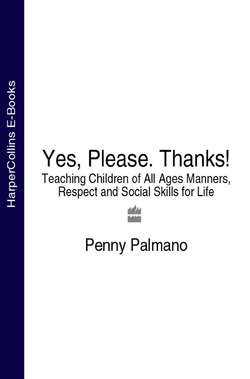Читать книгу Yes, Please. Thanks!: Teaching Children of All Ages Manners, Respect and Social Skills for Life - Penny Palmano - Страница 23
Teach why the word ‘No’ must always mean ‘No’
ОглавлениеHow many times have we watched a badly behaved child with its parents and thought to ourselves, ‘Doesn’t that child understand the meaning of the word “No”?’ The answer is, clearly, no.
But it’s not the child’s fault, as the parents have unintentionally trained him that way.
It is surprising how many children are taught that ‘No’ means ‘Maybe’ and, to some, ‘No’ eventually means ‘Yes’.
Parents eventually giving in to their children’s continual requests for something may seem harmless, but it will be a complete pain in the backside when, ten years down the line, it becomes a perpetual droning every time they want something.
And this is how it happens. For example, a toddler wants another biscuit and the parent says, ‘No.’ The toddler will then go on and on that she wants another biscuit. The parent still says, ‘No.’ Bear in mind toddlers have little conception of time. So the child continues to whine about the biscuit. The parent often becomes fed up with the whining and to keep the peace gives in and gives the child another biscuit with some lame response, such as, ‘Now this really is your last one.’
By this seemingly harmless action, the child has been taught that although ‘No’ was said several times, if she whines long enough she will eventually get what she wants. And let’s face it, at the time it may seem so much easier to give in than to hold your ground, but be firm. And don’t be fooled by the dramatics; a young child begging for another biscuit then crying for just one more will pull at the old heart strings. Stand your ground. You are doing your child a disservice if you give in.
In a situation like this, if you have said, ‘No,’ remove the biscuits or the wanted item out of sight, and divert the child’s attention with a toy, a book, a drawing, anything. If you are in company, don’t be embarrassed, simply explain, you’ll get far more respect than if you’re seen to be giving in.
If you start this at an early age, a child will have learnt that ‘No’ means ‘No’ by the time they are three or four, and life will be much easier. This is not to say they will never ask a second or third time for something, after all you want them to show a bit of spirit, but they will expect and accept a definitive ‘No’.
